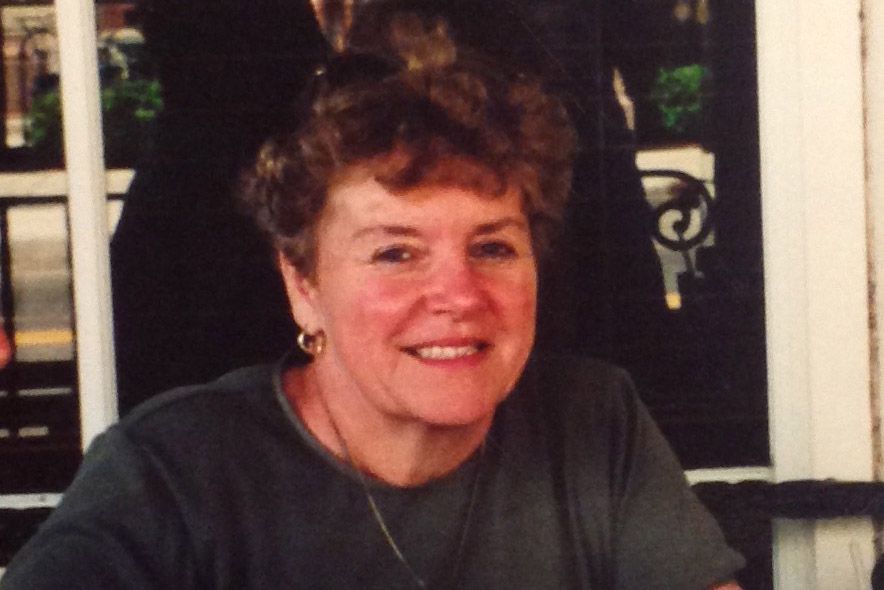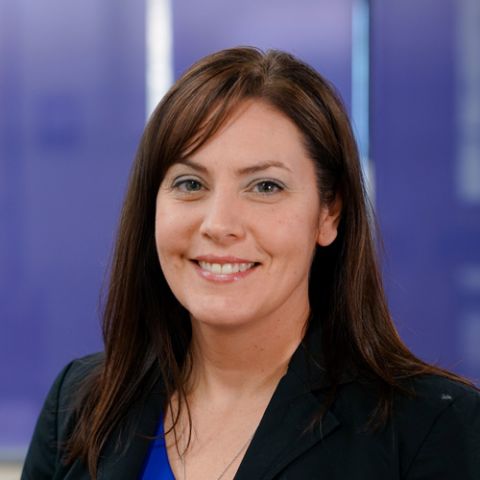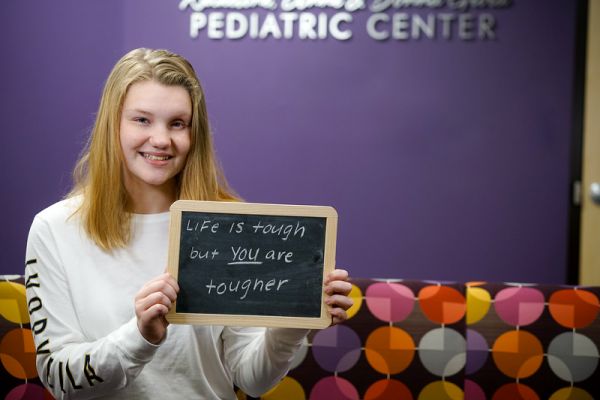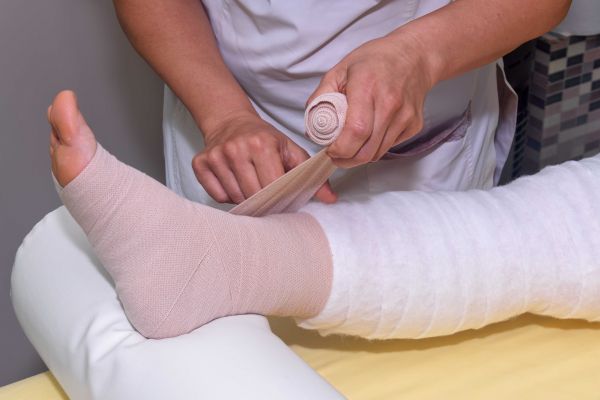Jill Waddington was just 15 when she noticed an odd bump on her leg.
A student in Falconer, New York, at the time, she felt the same spot when her book bag struck it several times a day as she walked to classes. “I kept hitting that bump, so my parents took me to the doctor in town,” she recalls. “He stuck a needle in it, thinking it was abscessed or something, but it didn’t go down.”
At that point, the doctor instructed Jill and her parents to go to Roswell Park — then Roswell Park Memorial Institute — for another exam.
It was 1958.
Doctors removed the tumor and diagnosed her as having juvenile embryonal rhabdomyosarcoma, a rare childhood cancer of the soft tissue. Initially there was talk that she might lose her right leg, because not much was known about rhabdomyosarcoma at the time. After some discussion, her doctors decided to proceed with a course of radiation and chemotherapy instead.
Jill Waddington — now Jill Swanson — remembers those treatments. “My parents would take me up on Monday and I’d come home on Friday. This would happen every week for months — I’m not even sure how long.”
It was a difficult process, with the wound often crusting over between treatments. It was also a lonely time, as there were only a few other young cancer patients at Roswell Park. “I stayed in the children’s ward and would play with the younger kids,” she says. “There weren’t many big kids there.”
She was home for her 16th birthday and remembers her parents throwing a party for her.
“Then all of a sudden, I didn’t have to go back to Roswell, and they said they’d see me again in a few months. We got to five years and they said, ‘You’re cured; you’re going to be OK.’”
Swanson never lost use of her leg and remains an active and athletic adult, playing golf and swimming. Today the 76-year-old grandmother and great-grandmother splits her time between Frewsburg, New York, and The Villages retirement community in Florida. Three of her four daughters live nearby in Jamestown and Frewsburg, as do most of her nine grandchildren and three great-grandchildren.
She says she’s been healthy most of her life, except for a diagnosis of lymphedema in 2000. She experienced a blow to her leg and had an issue with her right leg swelling, so she returned to Roswell Park to be examined. Doctors determined that she had the condition, which is characterized by swelling in the legs or arms due to the pooling of protein-rich fluid. Lymphedema often is associated with the removal of lymph nodes during cancer treatment.
Children and Young Adult Support Programs Help Patients
Some things have changed at Roswell Park since Swanson’s first visit in 1958. For example, today our younger patients benefit from survivorship services and youth cancer support programs.
Childhood and adolescent cancers are still mysterious to doctors, because so much is unknown about what causes them, says Denise Rokitka, MD, MPH, Roswell Park's Director of Pediatric and Adolescent Cancer Survivorship. However, due to improvements in treatment and supportive care, the overall survival rate for childhood cancer is approximately 80%.
What is clear is that after treatment, younger cancer survivors can face several long-term complications, ranging from mild to severe. “In our Pediatric & Adolescent Survivorship Clinic, we tailor the message to each patient, giving each a survivorship care plan and describing chemotherapy, radiation and other treatment long- term side effects that can occur and what surveillance is necessary, including cancer screening to maintain health,” Dr. Rokitka says. “For example, we know there’s a 30-fold increase in breast cancer among Hodgkin lymphoma survivors who have had chest irradiation, so mammograms and breast MRIs are started much earlier” than would be recommended for people without a history of cancer.
Pediatric Support Services
Find out about the many pediatric support services Roswell Park offers.
Learn MoreSwanson’s parents did the best possible thing for her by listening to her concerns and taking her to a doctor right away, Dr. Rokitka adds. “Parents are their child’s best advocate. Parents often report that they kept going back to their doctor because something wasn’t right. When a child is diagnosed with cancer, it’s important to let parents know that the cancer isn’t their fault; they can feel personal guilt at times. It’s important for them to understand they did not do something to cause their child’s cancer.”
Today’s younger cancer patients at Roswell Park have the benefit of child and adolescent programs, including Courage of Carly, offering not only support for young patients but also activities and events to offer a feeling of normalcy during a difficult time.
Cancer Treatment Can Have Lingering Effects
Young patients in particular have their lives upended, and it can be both scary and confusing for them. In some cases, they are removed from school and their normal lives for the duration of their treatment and miss out on a lot of normal childhood and teenage things.
Some young patients also need extra support for their emotional and mental health and well-being, Dr. Rokitka says. “The psychosocial impact of cancer at a young age is huge. A lot of these programs are great because they help kids meet other kids going through the same thing. These kids can develop long-lasting relationships. We also have a psychosocial team consisting of a psychologist, social worker and child life specialist who can help with additional needs and create an environment of trust for the patients.”
She also stresses the importance of all survivors continuing to make annual visits for follow-up care. Follow-up care is important to empower patients to educate themselves about their own health risks and how to mitigate those risks by following screening recommendations and making healthy lifestyle choices.
A Full, Well-Lived Life
Although Jill Swanson didn’t have youth cancer survivor programs available to her as a teenager, she remains thankful for the care she received at Roswell Park. “I am grateful to Roswell Park for saving my life,” she said in a recent letter. “You have no idea how blessed, thankful and grateful I am for the doctors, nurses and staff who took such great care of me. 'Thank you' seems so small compared to the second chance in life Roswell Park gave back to me so many years ago. What an amazing life I have lived!”
Editor’s Note: Cancer patient outcomes and experiences may vary, even for those with the same type of cancer. An individual patient’s story should not be used as a prediction of how another patient will respond to treatment. Roswell Park is transparent about the survival rates of our patients as compared to national standards, and provides this information, when available, within the cancer type sections of this website.



